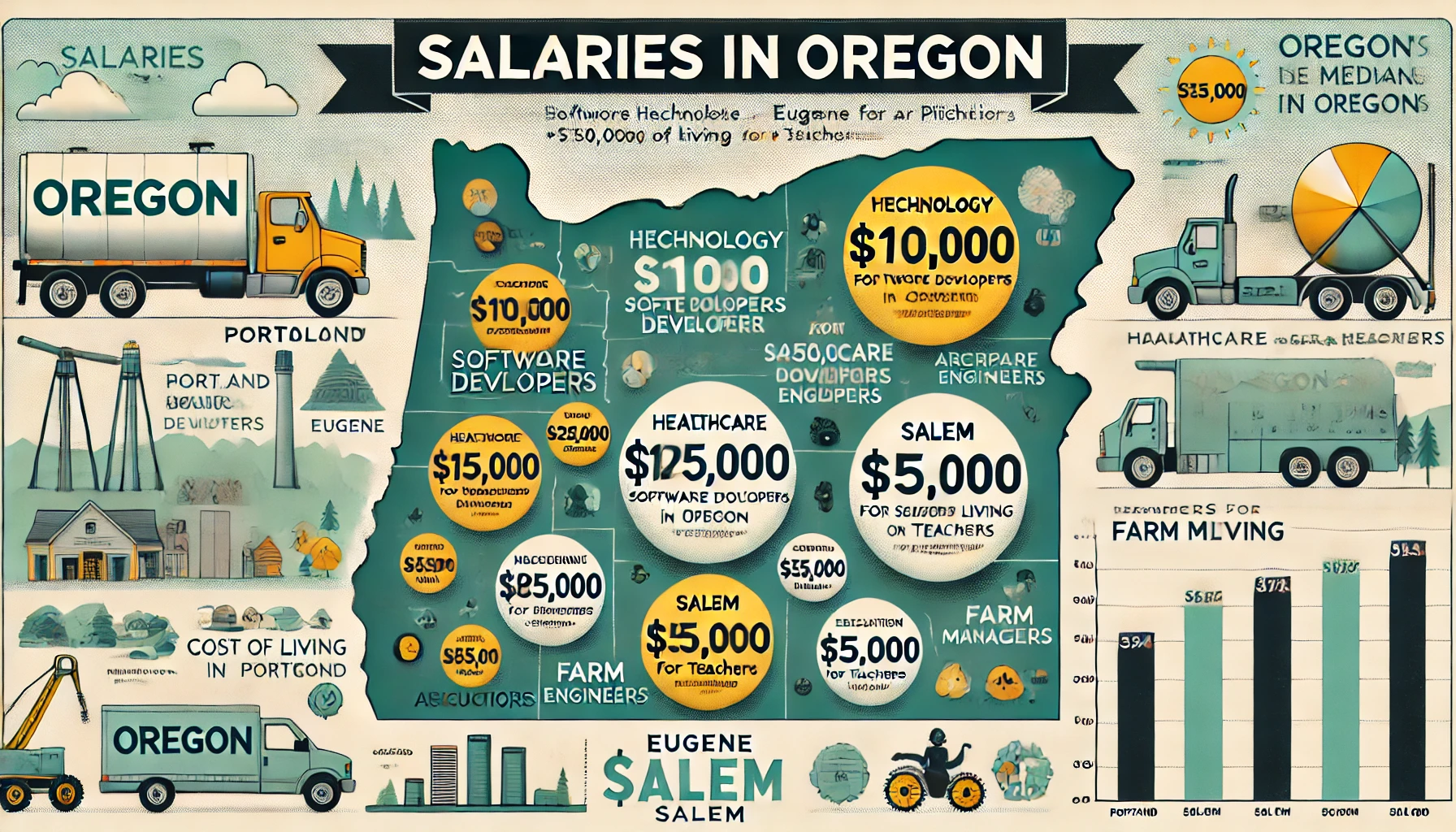Introduction
Oregon, located in the Pacific Northwest, is known for its diverse economy, stunning natural landscapes, and a vibrant mix of urban and rural communities. With a population exceeding 4 million, Oregon boasts industries ranging from technology and healthcare to agriculture and tourism. The state’s economic diversity is reflected in its salary structures, which vary widely by industry, location, and occupation.
In this article, we’ll explore the factors influencing salaries in Oregon, median wages across industries, regional variations, and emerging trends in the labor market. Oregon’s salary landscape is shaped by its dynamic economy, high demand for skilled workers, and regional cost-of-living differences, particularly between urban centers like Portland and rural areas.
Key Factors Influencing Salaries in Oregon
Salaries in Oregon are affected by several key factors:
- Industry Diversity: The state’s economy spans multiple sectors, with high-paying roles in technology, healthcare, and manufacturing. Tourism, retail, and agriculture also provide significant employment but often offer lower wages.
- Cost of Living: Oregon’s cost of living, particularly in cities like Portland, is higher than the national average. This has a direct impact on salary expectations and standards.
- Education and Skills: Jobs requiring advanced degrees or specialized certifications, such as software development or healthcare, tend to offer higher salaries than roles in retail or hospitality.
- Location: Urban areas like Portland, Eugene, and Salem offer higher average salaries due to increased demand for skilled workers and higher living costs. Rural regions often have fewer job opportunities and lower wages.
- Experience and Seniority: As in most states, salaries in Oregon increase with experience and seniority, especially in industries like technology, healthcare, and education.
Median Salaries Across Industries in Oregon
Oregon’s economy supports a wide range of industries. Here’s a breakdown of median annual salaries in key sectors:
Technology
- Software Developers: $105,000
- IT Specialists: $85,000
- Data Analysts: $75,000
- Cybersecurity Experts: $115,000
Technology is one of Oregon’s fastest-growing sectors, driven by the tech hub in Portland and the presence of major companies like Intel and Tektronix.
Healthcare
- Registered Nurses (RNs): $95,000
- Physicians and Surgeons: $250,000+
- Medical Technologists: $65,000
- Healthcare Administrators: $115,000
Healthcare is a critical industry in Oregon, with competitive salaries reflecting the high demand for medical professionals, especially in underserved rural areas.
Manufacturing and Trade
- Aerospace Engineers: $110,000
- Machinists: $60,000
- Assembly Line Workers: $50,000
- Quality Control Specialists: $70,000
Oregon has a strong manufacturing base, including aerospace and electronics, which supports high-paying roles for skilled workers.
Education
- Public School Teachers: $55,000
- University Professors: $80,000 to $120,000
- Educational Administrators: $100,000
While educators face challenges such as rising living costs, salaries in this sector are competitive, particularly for experienced professionals.
Agriculture and Natural Resources
- Farm Managers: $60,000
- Agricultural Technicians: $45,000
- Forestry Workers: $55,000
- Environmental Scientists: $80,000
Agriculture, forestry, and natural resources play a vital role in Oregon’s economy, offering stable employment opportunities, particularly in rural regions.
Retail and Hospitality
- Retail Managers: $50,000
- Chefs: $55,000
- Hotel Managers: $60,000
- Customer Service Representatives: $40,000
Although salaries in this sector are relatively low, the tourism-driven economy provides significant job opportunities.
Regional Salary Variations in Oregon
Portland Metro Area
As Oregon’s largest city and economic hub, Portland offers some of the highest salaries in the state:
- Software Developers: $110,000
- Nurses: $100,000
- Marketing Managers: $90,000
The high cost of living in Portland often justifies these elevated salaries, particularly in competitive industries like technology and healthcare.
Eugene
Eugene, home to the University of Oregon, has a strong education and healthcare presence:
- Educators: $65,000
- Healthcare Workers: $85,000
- Environmental Scientists: $75,000
Salem
As the state capital, Salem provides a mix of government and private sector roles:
- Government Administrators: $80,000
- Accountants: $70,000
- Legal Professionals: $95,000
Rural Oregon
In rural areas, salaries tend to be lower, but the cost of living is also significantly reduced:
- Agricultural Workers: $45,000
- Forestry Workers: $50,000
- Retail Workers: $35,000
Cost of Living and Salary Comparison
Oregon’s overall cost of living is above the national average, particularly in housing. However, salaries in industries like technology and healthcare often compensate for these higher expenses. For example:
- The national median salary is approximately $55,000, compared to Oregon’s median of $60,000.
- Housing costs in Portland are 30% higher than the national average, but rural areas like Medford offer more affordable options.
Trends in Salary Growth
Technology Expansion
Oregon’s technology sector continues to grow, attracting both startups and established firms. Salaries for tech roles, especially in Portland, are expected to rise as the demand for skilled workers increases.
Healthcare Needs
The aging population in Oregon has created a surge in demand for healthcare professionals. Salaries in this sector, particularly for nurses and healthcare administrators, are projected to grow.
Renewable Energy
With a focus on sustainability, Oregon is investing in renewable energy projects, creating opportunities for engineers and technicians. Salaries in this emerging field are expected to be competitive.
Remote Work Opportunities
The shift to remote work has allowed many Oregonians to access higher-paying roles with companies based in larger markets, further boosting average salaries in the state.
Conclusion
Salaries in Oregon reflect the state’s economic diversity and regional characteristics. While urban centers like Portland and Eugene offer higher wages, rural areas provide more affordable living options, balancing the lower salaries typically found there. Industries like technology, healthcare, and manufacturing continue to drive wage growth, while sectors like retail and hospitality provide stability and opportunities for entry-level workers.
Oregon’s focus on innovation, sustainability, and economic development positions the state for continued salary growth and workforce expansion. For residents and newcomers alike, Oregon offers a mix of competitive salaries, career opportunities, and an unmatched quality of life.




